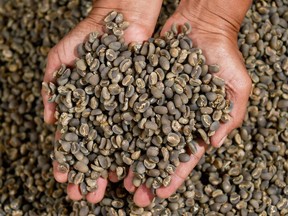The price of arabica coffee futures has surged to near-record highs, driven by global supply concerns and a severe drought in Brazil. This rally is set to be the largest monthly gain since 2014, with prices increasing by over 32% this month alone.
Supply Fears Drive Price Hike
Supply shortages of the arabica bean, which is used for specialty brews, have pushed up futures markets significantly. The bean has become increasingly scarce due to a severe drought in top coffee grower Brazil, which has raised concerns about the size of the country’s crop next season. This follows fears about the cheaper robusta variety produced in Vietnam, which was hit by dry weather at the start of the growing season and heavy rains as the harvest started.
Analyst Weighs In on Market Trends
Steve Pollard, a coffee market analyst at Marex Group, noted that "two years of global production below consumption left stocks in destination countries about a third below their long-term average." He added that early reports of the 2025/26 Brazil cherry set point to another year-on-year decline in production, meaning there will be no relief in destination markets for the foreseeable future.
New York Arabica Futures Surge
New York arabica futures gained as much as 3.8% before paring gains on Friday, the first day of trading following the U.S. Thanksgiving holiday. Logistical and shipping delays out of Brazilian ports and uncertainty over the European Union’s deforestation regulation have also added pressure to the market.
Other Softs Markets: Cocoa and Sugar
In other softs markets, New York cocoa futures are on track for the largest monthly gain since March. However, raw sugar is set to post a monthly loss.
Impact on Consumers
The price hike of arabica coffee may have significant implications for consumers, particularly those who enjoy specialty brews. With global production below consumption and supply shortages driving prices up, it’s likely that the cost of coffee will continue to rise in the coming months.
Market Trends: A Long-Term Perspective
While the current price hike is a result of short-term supply concerns, it’s essential to consider the long-term trends in the coffee market. Over the past decade, global production has consistently fallen below consumption, leading to stockpiles that are about a third below their long-term average.
Expert Analysis: A Drought-Stricken Brazil
Brazil is the world’s largest producer of arabica coffee, accounting for over 30% of global production. The current drought in the country has raised concerns about the size of its crop next season, which could exacerbate supply shortages and drive prices even higher.
Logistical and Shipping Delays: A Major Concern
In addition to supply shortages and drought-stricken Brazil, logistical and shipping delays out of Brazilian ports have added pressure to the market. The uncertainty surrounding the European Union’s deforestation regulation has also contributed to the price hike.
Conclusion
The price of arabica coffee futures is on track for its largest monthly gain since 2014, driven by global supply concerns and a severe drought in Brazil. As the market continues to trend upwards, it’s essential to consider both short-term and long-term factors that may impact prices. Consumers who enjoy specialty brews should prepare themselves for potentially higher prices in the coming months.
Recommendations
- Investors: Consider diversifying your portfolio to include a mix of commodities, including coffee.
- Consumers: Be prepared for potential price hikes and consider alternatives to specialty brews.
- Producers: Focus on improving efficiency and reducing costs to stay competitive in a market with increasing prices.

